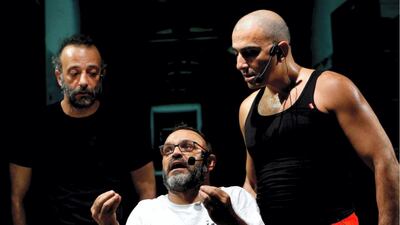The actor Ziad Itani became famous in Lebanon for being framed as an Israeli spy, an unforgivable accusation in a country traumatised by 18 years of Israeli occupation and a 33-day war in 2006.
Arrested in November 2017, Itani quickly confessed under torture that he had been seduced on social media by a green-eyed Swedish beauty with the exotic name Colette Vianvi, who worked for the Israeli spy agency Mossad. He said the confession was made under torture, an accusation the authorities have never responded to.
The scandal took an unexpected twist when it turned out Itani, 42, was innocent and the charges had been fabricated by Suzan Hajj Hobeiche to take revenge for being sacked from her job as head of Lebanon’s powerful anti-cybercrime bureau. She was arrested in March, the same month Itani was freed, and is currently facing trial.
Itani is now the star of a dark comedy based on his ordeal that he wrote with fellow actor Khaled Soubeih. Called Colette Didn't Turn Up, the well-received play has been modified only slightly from the original story: the victim of an influential woman's revenge is a simple baker.
The story, however, does not end there.
Itani was questioned for three hours last week by the anti-cybercrime bureau after Mrs Hajj Hobeiche's husband, lawyer Ziad Hobeiche, filed a complaint against his play. The problem? Itani’s character in the play is named Fawzi, which is also the name of Mr Hobeiche’s father and son.
"I had no idea and anyway, it's not up to the anti-cybercrime bureau to decide what can be included in my play or not," the actor told The National on Sunday, speaking in the green room before a performance at Beirut's Metro Madina theatre.
All plays and films presented in Lebanon are first approved by General Security, an intelligence branch separate from the smaller branch that arrested Itani, called State Security.
But the complaint also included a Facebook post by Itani linking to a news story critical of Mr Hobeiche and a post calling his wife a “police fashionista”.
“I deleted them in front of the officer and signed an agreement saying I wouldn’t post anything about Mr Hobeiche in the future," Itani said. “I don’t care about fighting over this."
Over the past few years, cases of journalists or bloggers being detained over Facebook posts critical of prominent public figures have increased, raising concerns about freedom of expression.
Itani accused Mr Hobeiche of bullying him because of the complaint he filed at the military court in November against Mrs Hajj Hobeiche, the hacker who allegedly helped her and four members of State Security. Among other charges, he accuses the six of criminal conspiracy and the State Security members of torture.
Mrs Hajj Hobeiche is already facing several charges such as fabricating evidence and pirating ministry websites.
When she appeared in court on February 7, she cast most of the blame on Elie Ghabache, a hacker she admitted she contacted to check if Itani had something to hide which could be dug up and used against him. However, she denied asking him to fabricate evidence.
She was sacked for "liking" a controversial tweet about women driving in Saudi Arabia, a "like" that Itani took a screenshot of and shared on social media. Confusingly, a journalist whose name is also Ziad Itani, used the screenshot in an article about Mrs Hajj Hobeiche.
On the day of his arrest, Itani was picked up from the street, shoved into a car with a hood over his head and brought to a dark cell with blood stains on the walls. “Twelve men were hitting me, accusing me of being a spy, saying they would rape my wife and my 11-year-old daughter. Then they started taking off my clothes as if they were going to rape me too. Of course, I said what they wanted to hear," he recalled.
Hoping to buy time until friends intervened to get him out of prison, he said he made up a complicated plot straight out of a cheap spy novel, including a sex tape, money transfers and furtive meetings in Istanbul with the imaginary Colette Vianvi.
“I said everything they wanted me to say. It was easy, the answers were in the questions," he said, laughing.
Itani remained light-hearted as he described how he was tortured – beaten with electric cables on the soles of his feet and hung by his wrists from the ceiling for hours.
“His sense of humour saved him," said Soubeih, the play's co-author. “Seven days after his release, he was already joking about his arrest."
But some memories still hurt too much too speak about.
“On my second day in prison, my captors showed me the newspaper headlines on their phones that said I was an Israeli spy. The worst was my best friend’s Facebook post insulting me. Until then, I had thought he was going to help," he said. Eyes brimming with tears, he walked out for a smoke.
Soubeih completed the story. “It was also his daughter’s birthday the next day. He had promised her to be there as their relationship was tense at the time because he had recently remarried. He thought that if he signed anything they wanted, he could see her for an hour."
The hour was not granted, and Itani’s new wife left him.
In Colette Didn't Turn Up, nobody is spared the main character's anger: the media for parroting State Security, politicians for their cowardice and the intelligence apparatus for its violence. The show, which has been staged three nights a week since November and is regularly sold out, ends with a call for Lebanon's sectarian political system to be reformed.
As Itani tests Lebanon's freedom of speech and Mrs Hajj Hobeiche’s trial continues, the fallout from the incident remains a public spectacle in more ways than one.

